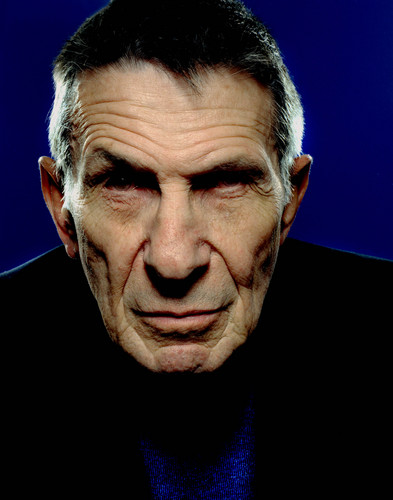Thoughts upon the death of Leonard Nimoy.
![color_nimoy_headshot[1]](https://nathanshumate.com/wp-content/uploads/2015/02/color_nimoy_headshot1-393x500.jpg) For some reason, I’ve composed in my head my personal obituary for William Shatner for years. Not for Leonard Nimoy. Only today am I wondering why that is.
For some reason, I’ve composed in my head my personal obituary for William Shatner for years. Not for Leonard Nimoy. Only today am I wondering why that is.
Of course, I don’t know Shatner. I didn’t know Nimoy. (Or Kelley, who will of course always be mentioned when the other two are.) My only attachment is to the characters they brought to life, who loom so large in my own personal mythology that I literally cannot conceive of a version of myself who does not know of — and who does not feel that he knows — Kirk, Spock and McCoy.
People have blathered and pontificated about the “holy Trek triumvirate” for years, so the odds that I am expressing anything new here are low. But I’m discovering it for myself now.
The common formulation puts Spock on the rational side, McCoy on the emotional side, and Kirk in the middle as a hybrid of the two. (If you wanted to get Freudian… don’t.) But here’s what I think I’m understanding today:
As the target audience for Star Trek, and the stereotypical Trekkie fodder of insecure teen and preteen boys, we (speaking of my own experiences as if they’re universal, because that’s what the internet is for) sometimes felt like Spock, and sometimes felt like McCoy. Sometimes we felt like we were smarter than everyone, but would always remain outside and othered despite (or because of) our superiority. At other times we felt like we were governed by our emotions, roiling with the irrationality of our ever-so-human hormones, raging at a universe that didn’t seem to care just how strongly we felt.
We identified, in a manner wholly unlike aspiration. Just as we all want to be Bugs Bunny but fear we’re really Daffy Duck, so we felt like we were either Spock or McCoy when what we wanted to be was Kirk: confident, handsome, literally in command.
But there’s more to Spock: Even after the series ended, through the movies and his appearances on TNG and even in the rebooted franchise, he keeps growing as a person in a way that McCoy doesn’t. Even in a way that Kirk doesn’t. From weeping for V’Ger to “I have been and always shall be your friend” to “Tell her I feel fine” to “Logic is the beginning of wisdom, Valeris, not the end,” culminating in the old Spock of the Star Trek reboot — who smiles, who obviously has emotions while being in control of them, who knows himself and is confident in his own skin. Who is in command. It’s a character arc over forty years in the making.
I don’t know how to finish this. Some of these thoughts — the idea of wanting to be Kirk but feeling we are Spock or McCoy, especially — is brand new to me, and I’ll need to let it bat around in my head for a while. The important part is this: The man who brought to life one of the most formative characters in my life is gone, and I shall feel the loss.
